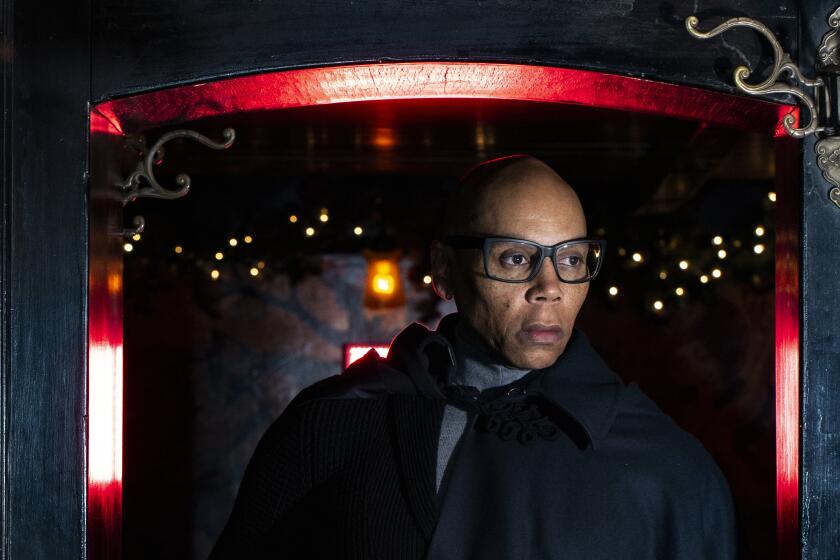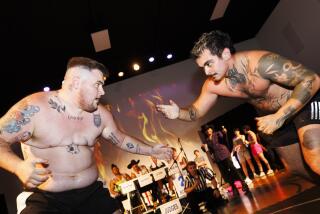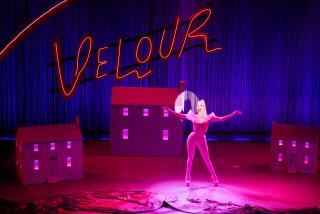L.A., you slay: Meet the local queens taking ‘RuPaul’s Drag Race’ by storm
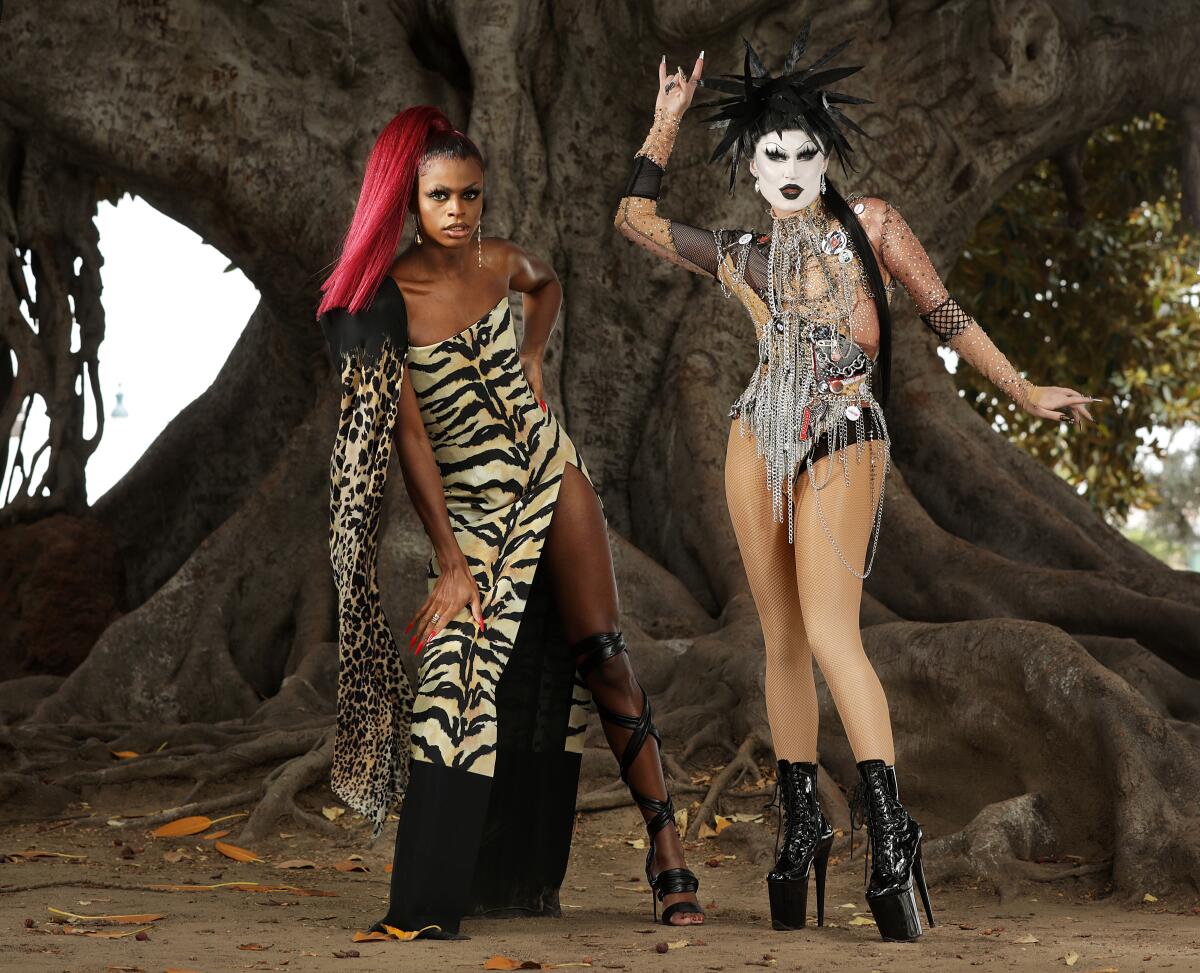
As fans of “RuPaul’s Drag Race” know, each season of the Emmy-winning reality competition delivers a breakout star whose charisma, uniqueness, nerve and talent, to quote the series’ namesake, earn them a place in the spotlight — even if they don’t go on to win. This season, though, there are two. And both are from Los Angeles.
Meet Symone and Gottmik, two queens with wildly different aesthetics and a similar trailblazing spirit from Season 13, currently running Fridays on VH1. Gottmik (who prefers she/her pronouns when in drag) is not only the series’ first-ever transmasculine contestant but her punk-rock “gorge” looks and wicked humor have also made her a front-runner to snatch the crown. Meanwhile, Symone delivers an “unapologetically Black” blend of sass and class to “Drag Race,” matching her L.A. compatriot step for flawless step.
“It’s great to see the L.A. queens slaying so hard,” says L.A.-based drag icon and Season 3 runner-up Manila Luzon.
“I feel like we’ve been fed how fierce New York queens are for so long,” adds Luzon, who was a New Yorker herself when she first shantayed into the werk room a decade ago. “These days, everyone’s coming to Los Angeles. It has become the new destination for queer creative types. And it’s the home of ‘RuPaul’s Drag Race,’ placing the queens in close proximity to the ecosystem that surrounds the entertainment industry and the show.”
The Times recently caught up with Gottmik and Symone, now vying for the “Drag Race” title, about how they ended up in L.A., what makes the city’s drag scene distinctive and the politics of their drag.
‘Drag Race’ host and Emmy winner RuPaul breaks new ground with his Netflix series ‘AJ and the Queen.’
Gottmik, you moved to Los Angeles six years ago from Scottsdale, Ariz., and, Symone, you’re originally from Conway, Ark., and have lived here for two years. What brought you to L.A.?
Gottmik: I always thought I was such a New York person because it’s so fast and crazy. But whenever I would come to L.A., I would get butterflies. I was like: “I just have to be there.” I don’t know what it was. It’s so intense, but so relaxed at the same time. It’s the weirdest vibe of people, and I just knew it was for me.
Symone: The vibe here is like nothing you can find anywhere else. People come here for the twinkle, the sparkle. I knew from a very young age that I wasn’t going to live my life in Arkansas. Especially for people like us, who come from places that are smaller and more conservative, there’s so much more culture and different points of view. The drag scene here, and “Drag Race” specifically, have opened up a lane for people to do drag at a different level, outside of bars.
What makes your drag representative of the L.A. scene?
Symone: In L.A., you have to figure out what makes you you: Home in on it and exploit it. You have to brand yourself and stand out from the pack.
Gottmik: On a more physical — not as cute — level than what Symone just said, the drag scene in L.A. is all about who’s the most beautiful, whereas in New York, it’s more about artistry. Symone and I both have this very feminine, glamorous style of drag, but with a twist. As in, Symone is the prettiest girl in the club, whereas I’m this clown, freak thing, that’s also pretty.
Symone: It’s not enough just to look the part. You need a personality so people want you at their party. L.A. is interesting, because there aren’t many drag shows. Instead, there are parties featuring drag queens, so it’s about the look and whether the queen has a personality that makes you want to be there.
How has drag helped you grow?
Symone: As a kid, I was very shy. I didn’t really like myself. I was Black and gay too, so I had all these things stacked against me. Then I discovered drag and saw these beautiful creatures and thought: “Oh, you get to put these things on and become a different person.” I had that mind-set for a very long time, but then, moving to L.A. and getting on “Drag Race,” I’ve learned that my drag is me, I am that person, and it’s been me the entire time. It’s all very “Wizard of Oz”: I had it all along.
Gottmik: When I started drag, it was almost the opposite. Because I was assigned female at birth, I used it as a mask. It was only when I put on my drag that people thought I was just another cis boy at the club. And I was like: “This is everything.” I found this weird balance, where I wasn’t too feminine, so I wouldn’t be triggered. That’s how I discovered my trademark clown-white face. It was literally a mask for me to put on and be who I wanted to be. I eventually realized I don’t need a mask for people to think I am a boy: I am a boy.
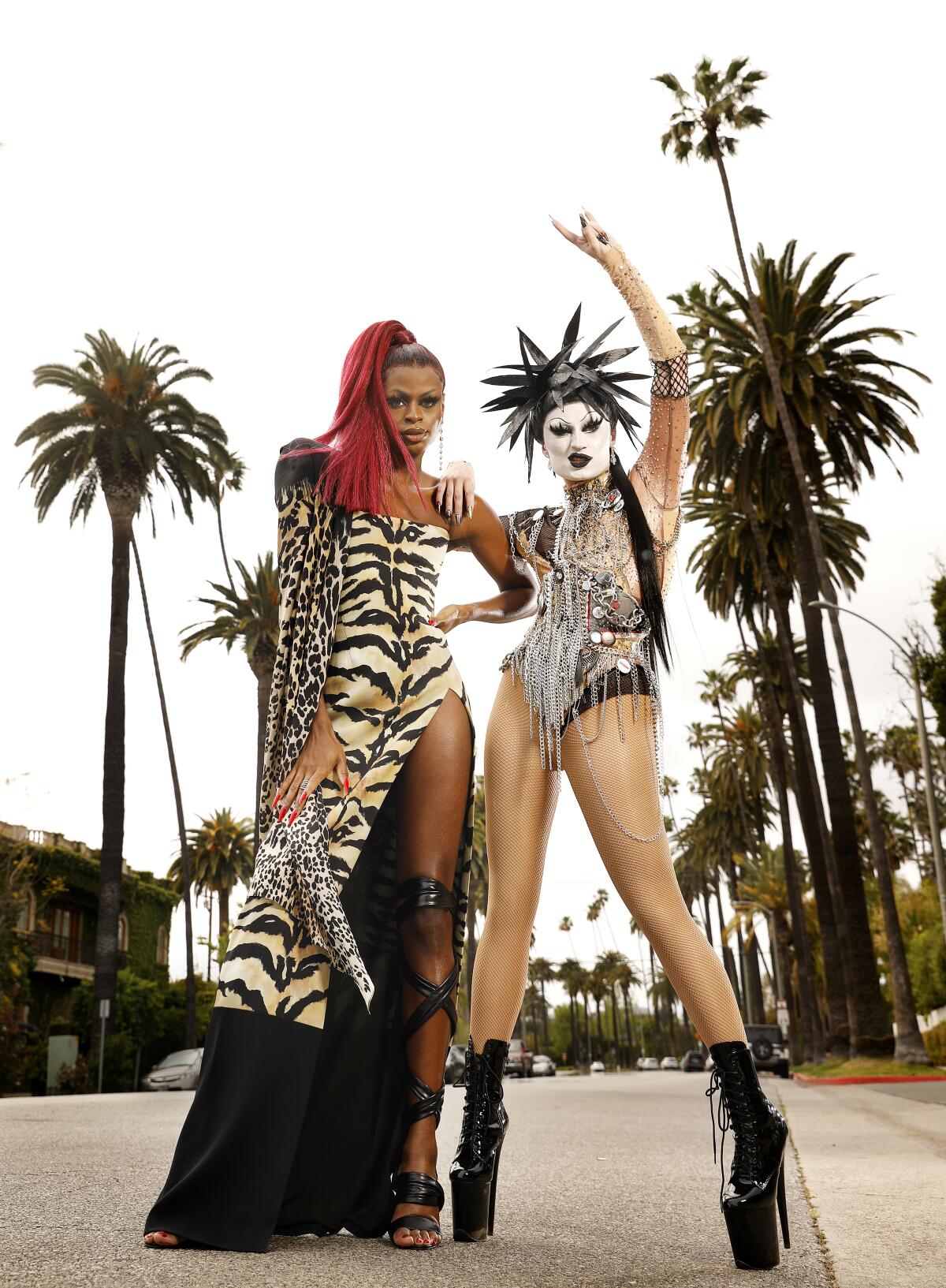
Symone: Drag saved my life in the sense that I don’t think I would be here today without it. I didn’t see a point in life as a kid — I didn’t really care. Drag saved my life because I gained confidence, it helped me find my voice and like myself and be content as long as I love what I’m doing.
Gottmik: When I was younger, I didn’t even know trans was a thing. I didn’t have the language for it, but I felt in my soul that something wasn’t right. One thing that held me back from transitioning was that, while I always felt that I was a man, I also had this very feminine side. Then I looked at all my friends — they are all the most feminine gay men you will ever see in your life — and thought, “Why would they be passable boys, but you’re not?” I realized that passing isn’t everything. You don’t have to do it, and it doesn’t make you a valid trans person.
Once I transitioned, even my friends were like, “You need to home in on your femininity, gorge, you’re getting a bit masc,” because even I was trying to be too masculine, because that’s how trans men are represented in the media. I’m proud to be telling my story and showing people that gender is a spectrum and you can do whatever makes you happy because that’s all that’s important.
On the show, you’ve both conveyed powerful political messages. Symone, you created a durag with a long train and a fascinator with the words “Say Their Names” as a homage to the Black Lives Matter movement. Gottmik, you re-imagined the “little black dress” to show the scars from your top surgery. Why is activism an important facet of your drag?
Symone: I think it comes naturally to me. It’s how I live my life. Social issues matter to me. Regardless of whether it’s about Black people, gay or trans people. For me, having the privilege of being on people’s TVs and being someone people look up to also means I have a responsibility to say something and not to just be pretty. I love everything associated with my culture, specifically being Black, so I did things like my fascinator look. I think my drag is something that’s never been seen before, and I think it’s needed now.
Gottmik: As the first transmasculine person to appear on the show, I felt a lot of pressure. But when it came to the runways, it relaxed me, because I know my silhouettes and what I look like in drag. All I had to do was be unapologetically trans. The little black dress was so easy for me, because I got to walk down that runway naked, as a trans man, showing off my scars and still having my silhouette and just being everything that makes Gottmik Gottmik. I’m proud of my runways and how I’ve been able to represent trans people. It’s been such a magical, crazy ride — I just love it.
‘RuPaul's Drag Race’
Where: VH1
When: 8 p.m. Friday
Rating: TV-14 (may be unsuitable for children under the age of 14)
More to Read
The complete guide to home viewing
Get Screen Gab for everything about the TV shows and streaming movies everyone’s talking about.
You may occasionally receive promotional content from the Los Angeles Times.
